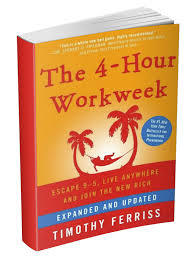Challenging and Redefining Cultural Assumptions About Work, Money, Purpose, and Success
The power of this book is not so much in teaching you how to work less through efficiency, elimination, and negotiation (although it can do that), but in offering alternatives to the cultural assumptions many of us hold about what is important in life.
For example, most people try to arrange their lives so they get to work when they want. But no one asks, “How much should I work?” Even the self-employed try to yoke themselves to a 9-5 schedule, or an 8 hour work day, or feel guilty spending days in the sunshine when their friends are hunched over behind desks.
Tim Ferriss suggests that instead we strive to work the minimum amount of hours for the maximum amount of output.
A Shift to Questioning the Norm and Finding Your Calling
This is indicative of the general shift the book encourages readers to take: from people who work within the agreed upon system in order to achieve wealth (which implicitly assumes wealth will lead to later happiness) to people who create the circumstances and systems in their lives to pursue their own individual passion and excitement.
[In Integral parlance, the book asks for the shift from an unhealthy “orange”—a hyper-rational modernistic thinking, to a healthy and individualistic “green”—following your own bliss.]
Other important shifts include:
-
Pursuing experiences that enliven you in the place of possessions
-
Earning enough money to finance your passions instead of wanting more for the sake of itself
-
Defining your own dreams instead of blindly accepting the cultural norm
-
Confronting fears by clearly defining and exploring them
-
Getting rid of the that which is unimportant for your life purpose and happiness
-
Getting out of the way, letting go, and empowering people who work for you instead of taking control and managing them
He even mentions meditation at one point, discusses the sense of ennui that can arise as a result of letting go of these lifelong cultural habituations, and comes dangerously close to philosophy in discussing the meaning of life—but his insistence on rational thought often feels cold and harsh.
Rational Self-Interest Leaves Some Things Out
Tim misses other important perspectives. I find myself wondering “How can this be available to everyone?” and “Are the outsourced Indian employees paid a living wage?” (the answer is yes) “Does he have close friends that he just chats with, or are all phone calls distractions from his excitement-seeking?” He encourages everyone to travel light and get rid of clutter, but never considers that the very businesses he encourages people to create might be creating clutter for the people buying those products.
In his blog posts he discusses his own schedule, how he does actually work more than four hours a week—but if it is a passion he does not consider it work. The book is missing this important distinction.
Practical, Fun, and Limited
Overall I found myself excited by the possibilities laid out in the book, and I enjoyed bringing up some of its high points in my conversations. The exercises, challenges, and questions at the end of each chapter are particularly helpful, and I appreciated the practicality of it—there are even specific email templates and phone scripts for people to use.
On the other hand, I’m a bit embarrassed to recommend it to a friend unless I know they are interested in finding alternative income streams, or think they might want a push in the direction of career self-determination. It is practical, intense, fun, and finally, not for everyone.
Summary of the Four Hour Work Week Process: Define, Eliminate, Automate, and Liberate.
Defining is about redefining what we care about.
Elimination part is about getting rid of what is unimportant in life. This is refreshing because it isn’t about monkdom.
Automation walks the reader step by step through creating an almost fully automated online business to provide them with a enough cash flow to pursue dreams.
Liberation lays out the specific steps an employee can take to maintain their current job while working less and traveling more, and guides readers on how to travel for cheap.

